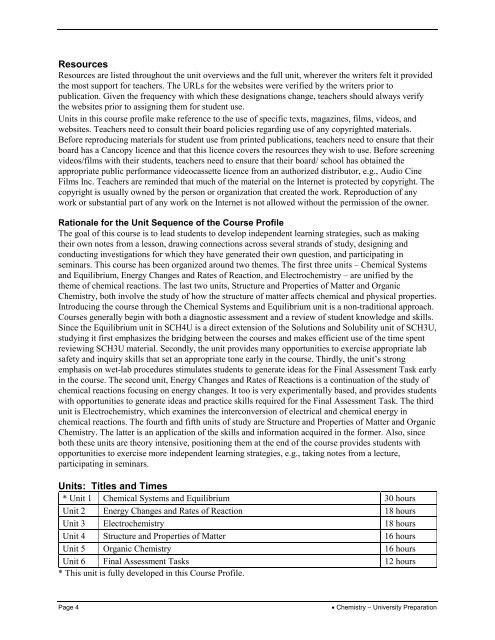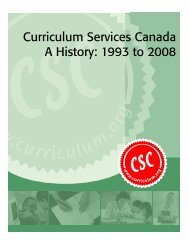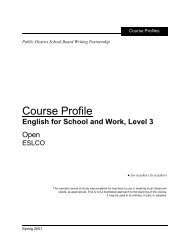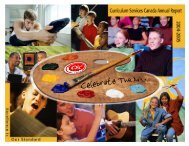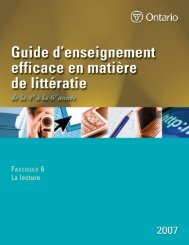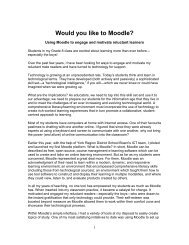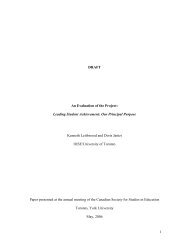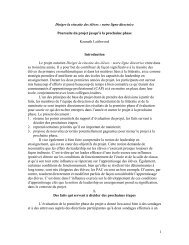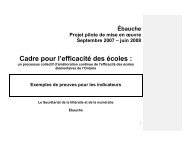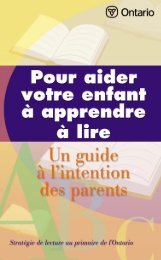Course Profile - Curriculum Services Canada
Course Profile - Curriculum Services Canada
Course Profile - Curriculum Services Canada
You also want an ePaper? Increase the reach of your titles
YUMPU automatically turns print PDFs into web optimized ePapers that Google loves.
Resources<br />
Resources are listed throughout the unit overviews and the full unit, wherever the writers felt it provided<br />
the most support for teachers. The URLs for the websites were verified by the writers prior to<br />
publication. Given the frequency with which these designations change, teachers should always verify<br />
the websites prior to assigning them for student use.<br />
Units in this course profile make reference to the use of specific texts, magazines, films, videos, and<br />
websites. Teachers need to consult their board policies regarding use of any copyrighted materials.<br />
Before reproducing materials for student use from printed publications, teachers need to ensure that their<br />
board has a Cancopy licence and that this licence covers the resources they wish to use. Before screening<br />
videos/films with their students, teachers need to ensure that their board/ school has obtained the<br />
appropriate public performance videocassette licence from an authorized distributor, e.g., Audio Cine<br />
Films Inc. Teachers are reminded that much of the material on the Internet is protected by copyright. The<br />
copyright is usually owned by the person or organization that created the work. Reproduction of any<br />
work or substantial part of any work on the Internet is not allowed without the permission of the owner.<br />
Rationale for the Unit Sequence of the <strong>Course</strong> <strong>Profile</strong><br />
The goal of this course is to lead students to develop independent learning strategies, such as making<br />
their own notes from a lesson, drawing connections across several strands of study, designing and<br />
conducting investigations for which they have generated their own question, and participating in<br />
seminars. This course has been organized around two themes. The first three units – Chemical Systems<br />
and Equilibrium, Energy Changes and Rates of Reaction, and Electrochemistry – are unified by the<br />
theme of chemical reactions. The last two units, Structure and Properties of Matter and Organic<br />
Chemistry, both involve the study of how the structure of matter affects chemical and physical properties.<br />
Introducing the course through the Chemical Systems and Equilibrium unit is a non-traditional approach.<br />
<strong>Course</strong>s generally begin with both a diagnostic assessment and a review of student knowledge and skills.<br />
Since the Equilibrium unit in SCH4U is a direct extension of the Solutions and Solubility unit of SCH3U,<br />
studying it first emphasizes the bridging between the courses and makes efficient use of the time spent<br />
reviewing SCH3U material. Secondly, the unit provides many opportunities to exercise appropriate lab<br />
safety and inquiry skills that set an appropriate tone early in the course. Thirdly, the unit’s strong<br />
emphasis on wet-lab procedures stimulates students to generate ideas for the Final Assessment Task early<br />
in the course. The second unit, Energy Changes and Rates of Reactions is a continuation of the study of<br />
chemical reactions focusing on energy changes. It too is very experimentally based, and provides students<br />
with opportunities to generate ideas and practice skills required for the Final Assessment Task. The third<br />
unit is Electrochemistry, which examines the interconversion of electrical and chemical energy in<br />
chemical reactions. The fourth and fifth units of study are Structure and Properties of Matter and Organic<br />
Chemistry. The latter is an application of the skills and information acquired in the former. Also, since<br />
both these units are theory intensive, positioning them at the end of the course provides students with<br />
opportunities to exercise more independent learning strategies, e.g., taking notes from a lecture,<br />
participating in seminars.<br />
Units: Titles and Times<br />
* Unit 1 Chemical Systems and Equilibrium 30 hours<br />
Unit 2 Energy Changes and Rates of Reaction 18 hours<br />
Unit 3 Electrochemistry 18 hours<br />
Unit 4 Structure and Properties of Matter 16 hours<br />
Unit 5 Organic Chemistry 16 hours<br />
Unit 6 Final Assessment Tasks 12 hours<br />
* This unit is fully developed in this <strong>Course</strong> <strong>Profile</strong>.<br />
Page 4<br />
• Chemistry – University Preparation


